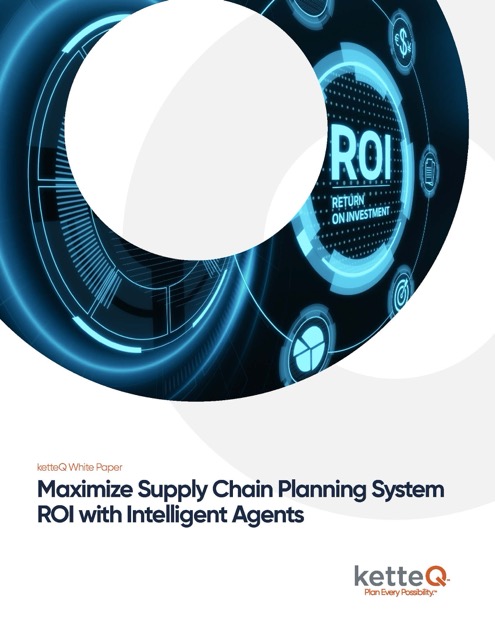
Operating at the Speed of the Consumer: A Q&A with Rick McDonald
I always enjoy my conversations with Rick McDonald. His forward-thinking mindset and deep CPG supply chain experience bring clarity to even the most complex challenges. During ketteQuest 2025, I had the chance to sit down with Rick, former Chief Supply Chain Officer at Clorox and now Chairman of ketteQ's Executive Advisory Board, for a candid discussion on what's working, what's broken, and where supply chain planning is heading next.
Q: Rick, can you share a bit about your background?
A: Sure. I'm a Georgia Tech grad, born and raised in Atlanta. After a brief attempt at baseball (let's just say I couldn't hit a Division I curveball), I started my professional journey at Frito-Lay. I worked across five manufacturing plants over 10 years before joining Clorox, where I spent the next 32 years. I retired in 2023 as the Chief Supply Chain Officer, overseeing 6,000 employees globally from procurement to the customer store shelf.
Now, I'm focused on keynote speaking, mentoring, and advisory work. I also serve as Chairman of the Executive Advisory Board at ketteQ.

Q: What is the biggest challenge in supply chain planning today?
A: Speed. Everyone is trying to operate at the speed of the consumer. Think about it; same-day, next-day, two-day shipping has become the norm, which means the buying cycle is incredibly compressed. To keep up, you need visibility to high-quality data and a modern supply chain planning solution like ketteQ that can run hundreds of scenarios simultaneously.
That's one of the many things that impressed me about ketteQ. The PolymatiQ™ engine can simultaneously evaluate millions of potential solutions to deliver the most optimal plan. It's a game-changer.
Q: What's broken in most supply chains?
A: Demand forecasting. Too many companies rely on backward-looking data. There's a lot of guesswork, and the flow of information between the point-of-sale and the brand owner is often weak. You need forward-looking forecasts that account for real-time data such as weather, illness trends, and external events. Without that, you're flying blind.
Q: How are today's disruptions shaping supply chain strategy?
A: Disruptions aren't going away. Whether black swan or gray swan events, there have been dozens or even hundreds over the last decade. Being resilient is good. Being agile is better. I used to think resilience was the goal, but I've come to believe agility, how you respond, pivot, and adapt, once an event has occurred is the true differentiator.
Q: Which technology excites you the most right now?
A: Artificial intelligence and demand sensing. It is critical to anticipate what the customer wants, when and where they want it. When we applied AI-based demand sensing at Clorox on our pilot SBU, our forecast accuracy improved by 15%, beyond what our best humans could do. That's a powerful unlock.

Q: Why did you join the Executive Advisory Board at ketteQ?
A: Mike Landry and I go way back. We worked together when his team helped us implement a supply chain planning platform at Clorox. I respected his leadership, execution, and strategic mindset. I was all in when I learned more about what ketteQ was building and how they were disrupting the supply chain market. It's a great team with an ambitious mission, and I wanted to be part of it.
Q: What has impressed or surprised you most about ketteQ?
A: The PolymatiQ™ Agentic AI solver engine is a game changer. It runs in the background, evaluating millions of scenarios to deliver optimal outcomes. That's rare and incredibly disruptive compared to legacy systems running one scenario at a time.
Q: How has supply chain strategy evolved over the past decade?
A: The pendulum has swung from offshoring to nearshoring to reshoring. Supply chains have become more strategic. Tools like digital twins and data-driven manufacturing footprints are reshaping how companies operate. The best strategies marry quality, cost, and customer service.

Q: What will separate tomorrow's top-performing supply chains from today's?
A: Three things:
1. Having the right mix of people and digital assets, especially as the labor shortage deepens.
2. Reverence for data – poor data quality is still far too familiar.
3. Digital fluency among leaders – you don't need to be a technologist, but must understand which tools solve which problems.
Q: Will supply chains ever be fully autonomous?
A: I don't think so; not thoroughly. Yes, yes, roles that are transactional and repetitive should be automated. But you'll always need human intelligence to curate, contextualize, and steer the strategy. Agents and humans will need to work together.
Q: Single-pass vs. multi-pass: what's your take?
A: Single-pass models are limited. They don't account for what's happening now. If something in the environment shifts materially, you won't be able to adapt fast enough. Multi-pass, probabilistic models give you the edge—you can move at the speed of the consumer, not behind them.

Q: How does a supply chain organization shift from reactive to adaptive planning?
It starts with leadership. The mindset, skill set, and toolset all matter, but the mindset is most important. Leaders need to be digitally fluent and deeply curious about what's possible. The tech is out there—the challenge is in the transformation and change management.
Q: What advice would you give your younger self?
A: I spent my first 15 years in manufacturing. If I could do it over, I'd have moved into logistics and planning sooner. I love to learn, and that broader exposure would have helped me understand the end-to-end dynamics earlier in my career.
Q: What excites you most about being part of ketteQ's journey?
A: It's the people. This smart, fast-moving, humble group is committed to helping companies plan better. There's a strong sense of urgency and no bureaucracy, which is refreshing. While our technology is innovative and impressive, the team makes it special and is the big disruptor.
Wrapping Up
Rick's insights are a powerful reminder that while tools and technology play a critical role, leadership, curiosity, and adaptability ultimately move supply chains forward. From demand sensing and agentic AI to digital fluency and data reverence, Rick offers a blueprint for what modern supply chain leaders must prioritize to stay ahead.
At ketteQ, we're honored to have Rick's experience and voice on our Executive Advisory Board as we continue building adaptive planning solutions that meet the speed, complexity, and demands of today's global supply chains.
Want to go deeper?
Watch the entire interview with Rick McDoanld.
Check out other blogs and videos in our Executive Advisory Board Spotlight Series, where we explore the insights and predictions shaping the future of supply chain planning.





